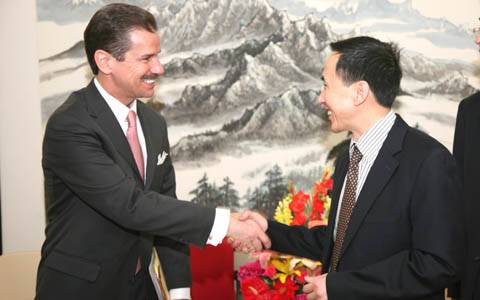
Photo: Han Lei
1. Once rights have been bought, you won’t necessarily know how to make money.
2. Not being familiar with foreign markets and regulations.
3. Not understanding how to do business with Westerners.
Despite the economic crisis at the end of last year, China’s business spending figures were RMB 43.1 billion with a huge 28.5 billion of that going on overseas spending – that’s four times that of 2007.
With the World well and truly in the grips of the economic crisis, Huanqiu Renwu took the time to talk to top international trade lawyer for Baker and McKenzie, Jia Dian’an (贾殿安) on the traps that Chinese business people often fall into when dealing with foreign customers.
Huanqiu Renwu (HR): With the crisis set to get worse in the coming year, do you think this could be an opportune time for Chinese investors?
Jia Dian’an: This is indeed an excellent time for Chinese businesses to invest overseas. With prices abroad at an all time low, Chinese people should take advantage of this. Plus, for a while now the Chinese economy has outgrown the amount of resources available in the domestic market and people will have to start looking abroad to grow their business. Plus, by going overseas with our business this will benefit China in that we will be able to quickly gain the skills, systems and brands we need to sustain growth in the long run.
HR: In the past few years there have been many success stories, as well as many failures. Can you give us any advice on doing business abroad?
Jia Dian’an: There are many reasons why Chinese investors in foreign countries come unstuck. The main reason lack of knowledge of the target – just having enough money is only the first step and many assume that is enough. Buying a business comes with its risks and problems. Secondly, many Chinese companies lack sufficient management skills and often cannot handle taking change of a Western company.
In addition there is a general ignorance among Chinese buyers as to Western business law. One risk is not having a proper legal check on the target company first. Foreign companies may have law suits filed against them that have been left for the new owner to take on.
A little bit of local knowledge goes a long way too. For example when a Japanese company bought a car manufacturing plant in the US, they aimed at one of the states in the far south with fewer laws governing unions. It meant that they avoid the workers setting unions and thus saved themselves 40% capital.

Photo: New York Times
HR: It is the US car industry that is one of the hardest hit at the moment. What could this mean for the Chinese car industry?
Jia Dian’an: There are three main reasons why Chinese cars have not broken into the US/EU markets. 1. Relatively backward technology. 2. Lack of well establish brand image. 3. Chinese cars do not meet with EU safety regulations. It is especially for the third reason that China has failed in this respect.
The US car industry is taking a big hit at the moment, but that doesn’t mean China’s will too. The domestic market is doing well, however we are still a long way off buying an entire US car company. What we can do is to look to buy the rights to certain technologies or the manufacture of spare parts, this can be very profitable.
HR: What type of overseas investment would be most profitable for Chinese business at the moment?
Jia Dian’an: The two main areas for investors to look are new technologies and new energy sources. Owning the rights to both of these will give us more power in the future and allow us to cut short the time and cost involved in carrying out our own research on our own products.
***
Business Guides > Beijing | Shanghai | Zhuhai | Chongqing
Biz China > China consumers ready to spend a bit more: survey
Biz China > China exports, trade surplus sharply down
Biz China > 81% respondents optimistic with 5-year outlook for business in China
Warning:The use of any news and articles published on eChinacities.com without written permission from eChinacities.com constitutes copyright infringement, and legal action can be taken.
All comments are subject to moderation by eChinacities.com staff. Because we wish to encourage healthy and productive dialogue we ask that all comments remain polite, free of profanity or name calling, and relevant to the original post and subsequent discussion. Comments will not be deleted because of the viewpoints they express, only if the mode of expression itself is inappropriate.
Please login to add a comment. Click here to login immediately.